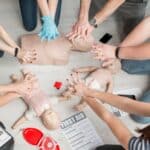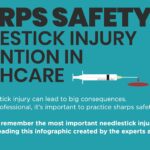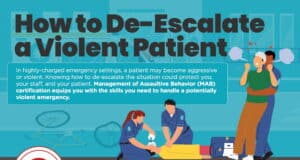More than 40% of healthcare workers have experienced workplace violence in the past two years, according to a recent report from Healthcare Finance. More than half of all respondents thought that episodes of violence have increased throughout their tenure.
The importance of management of assaultive behavior (MAB) certification is that it provides healthcare workers the necessary tools to de-escalate potentially dangerous situations. It includes key components like identifying a potential escalation, methods of negotiation, and steps to take if the situation becomes violent.
Medical professionals that work in highly charged situations are faced with the risk of aggressive behavior from patients who are in pain, disoriented, or frightened. Learning the proper mitigation techniques make the difference between an event that is de-escalated quickly or one that becomes explosive. MAB certification importance cannot be overstated.
What Does MAB Certification Involve?
MAB certification goes through each step to managing aggressive behavior, including:
- Identification of potential conflicts
- Escalation prevention
- Negotiation tactics
- Steps in the event of an emergency
Workplace aggression does occur, but not frequently enough to give healthcare professionals much practice in how to deal with challenging situations. Training and certification are essential so staff are prepared in the event an escalation does arise. The time to decide how to react to aggression is not in the heat of the moment, but long before any such moment occurs.
Healthcare workers have an ethical and legal obligation to care for patients. What happens when providing care becomes a dangerous undertaking? The importance of MAB training is that it also addresses the legal and ethical implications of workplace violence – from mitigating situations before they escalate to appropriate ways to restrain a violent patient.
Read What is a Management of Assaultive Behavior (MAB) Certification?
MAB Certification Benefits for Staff
MAB certification benefits include a safer workplace by equipping staff with the tools they need to handle any type of situation that might arise. The best way to stop violence is before it starts, so mitigation techniques are paramount to a safer work environment. When employees know how to quickly identify and de-escalate a potentially explosive situation, they can take steps to calm the patient and negotiate a peaceful resolution.
MAB certification courses teach healthcare professionals how to recognize the signs of escalation, which might include a raised voice, defiant posture, or throwing objects. This is the point where an employee can utilize de-escalation techniques such as:
- Remaining calm
- Practicing active listening
- Maintaining non-aggressive body language
- Ensuring there is back-up
- Asking questions rather than demanding action
Through simulation and role play, participants in MAB courses learn the steps they can take to reduce the risk for a violent act by a patient. With the proper training, staff members faced with a stressful situation like an angry, aggressive patient will be able to respond appropriately without reacting emotionally.
Why is MAB Certification Important for Employers?
Employers wondering about MAB certification importance should consider the benefits of ensuring staff is prepared for potentially charged events. First, a well-trained staff who knows the safest and most effective way to respond to an aggressive patient minimizes risk and liability to their employer and facility. Proper training reduces escalation and actions that could have legal or ethical ramifications.
Second, facilities that understand the importance of MAB training tend to be regarded more highly in the healthcare industry. The ability to provide a safe work environment will attract the highest quality of healthcare professionals to your facility. Top-notch staff will raise your reputation and your image.
In addition to creating a safer environment, MAB training benefits may include a higher level of patient care. An aggressive patient may cause treatment delays. The ability to calm the patient quickly so that treatment can begin immediately may result in a better outcome.
Finally, a reduction in incidents and possible injuries offers a financial advantage as well. Facilities spend more time caring for patients and less time filing reports or responding to legal action.
What are the Challenges of MAB Certification Training?
There are few downsides to MAB certification, as long as you choose a reputable program. First, be sure the course you choose is compliant with your state laws. Look for a course that is interesting and will hold the attention of your participants. Finally, if location is an issue, some training programs are fully online to allow your staff the ability to take the course from the comfort of their own home.
The MAB Certification Training Process
A comprehensive MAB certification program will likely include the following topics:
- What is assault? An overview of different types of assaultive behaviors
- Causes of assaultive behavior and the cycle of assault
- How to deal with aggressive patients and their family members
- Safety measures staff can use to prevent and address violence
- Factors to predict when behavior will become aggressive or violent
- Tactics to diffuse, de-escalate, and avoid violent behavior
- Strategies to prevent physical harm, including restraining techniques
Most MAB courses take 2-4 hours to complete and often include role play, simulations or demonstrations to illustrate possible situations and techniques to manage them. Once the course is completed, participants are awarded their certification, which may only be valid for one year depending on your state. Refresher courses are necessary to maintain certification.
No matter what your state requires, ongoing training and refresher courses are essential to ensure your staff remains prepared for a potentially violent situation. Since these events don’t arise regularly, consistent preparation and training is necessary so healthcare professionals are always ready if and when a situation becomes challenging.
Why is MAB Certification Important Enough to Prioritize?
MAB certification training may not be at the top of your to-do list, but it should be. MAB certification importance cannot be overstated, since a well-trained staff will lead to a reduction in aggression and violence and a safer workplace overall. Since safety is paramount to a more productive staff and a higher level of patient care, MAB training needs to be a non-negotiable component of workplace security.
Get the MAB certification training your staff needs at Surefire CPR. Our experienced instructors teach courses in person and online to ensure your entire team can get the training they need. With the right training, you can rest assured your staff will be prepared for any situation and your workplace security will remain at the highest possible level.











